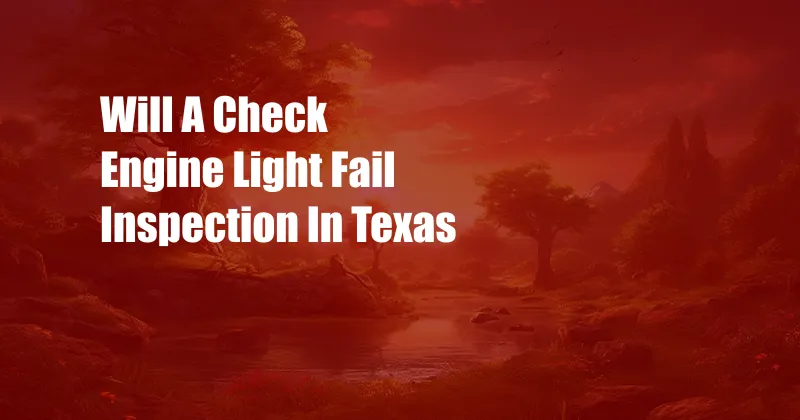
Will a Check Engine Light Fail Inspection in Texas?
As a driver, you know the dreaded feeling of seeing that pesky check engine light illuminate on your dashboard. It can be a source of anxiety, making you wonder what’s wrong with your car and how much it’s going to cost to fix it. But if you’re driving in Texas, there’s another concern that might cross your mind: will it cause you to fail your vehicle inspection?
In this article, we’ll delve into the details of check engine lights and their impact on vehicle inspections in Texas. We’ll explore the possible causes of a check engine light, the types of inspections it can affect, and what you can do if you encounter this issue during your inspection.
Vehicle Inspections in Texas
Texas requires regular vehicle inspections to ensure that vehicles meet safety and emission standards. There are two main types of inspections:
- Annual Safety Inspection: This inspection checks for basic safety-related components such as brakes, tires, lights, and seat belts.
- Emissions Inspection: This inspection measures the amount of pollutants emitted by your vehicle. It’s required for vehicles registered in certain counties in Texas.
Impact of a Check Engine Light on Inspections
Whether a check engine light will fail your vehicle inspection in Texas depends on the type of inspection being performed:
- Annual Safety Inspection: A check engine light will not cause you to fail your annual safety inspection. However, the inspector may note it on the inspection report, and it’s recommended to have it checked out by a mechanic.
- Emissions Inspection: A check engine light may cause you to fail your emissions inspection. The reason for this is that a check engine light can indicate a problem with your vehicle’s emissions system, which could lead to increased pollutant emissions.
Causes of a Check Engine Light
There are many potential causes of a check engine light, including:
- Loose or faulty gas cap
- Oxygen sensor issues
- Spark plug or ignition coil problems
- Catalytic converter issues
- Evaporative emissions system leaks
If your check engine light is illuminated, it’s important to have it diagnosed and repaired as soon as possible. Ignoring it could lead to more serious problems and increased repair costs.
Expert Advice for Check Engine Lights
Here are some tips for dealing with a check engine light in Texas:
- Get it diagnosed: If your check engine light comes on, take your vehicle to a mechanic or auto parts store for a diagnosis. This will help you determine the cause of the problem.
- Repair it promptly: If the diagnosis reveals a problem that needs to be repaired, don’t delay. Fix it as soon as possible to avoid further damage and costly repairs.
- Check your gas cap: Sometimes, a check engine light can be caused by a loose or faulty gas cap. Tighten it securely and see if the light goes off. If it doesn’t, there may be a more serious problem that needs attention.
FAQs about Check Engine Lights and Inspections
- Q: Can I still drive with a check engine light on?
- A: Yes, you can usually still drive with a check engine light on, but it’s not recommended. It’s best to have it diagnosed and repaired as soon as possible.
- Q: How much does it cost to fix a check engine light?
- A: The cost of fixing a check engine light varies depending on the cause of the problem. It could be as simple as replacing a gas cap or as expensive as replacing a catalytic converter.
- Q: What happens if I fail my emissions inspection because of a check engine light?
- A: You will not be able to register your vehicle until the check engine light is fixed and the vehicle passes an emissions inspection.
Conclusion
In Texas, a check engine light will not cause you to fail your annual safety inspection. However, it can cause you to fail your emissions inspection. It’s important to have any check engine light diagnosed and repaired as soon as possible to avoid more serious problems and costly repairs. By following the tips and expert advice provided in this article, you can ensure that your vehicle meets inspection standards and keeps you safe on the road.
Are you interested in learning more about check engine lights and vehicle inspections? Leave a comment below and I’ll be happy to answer your questions.